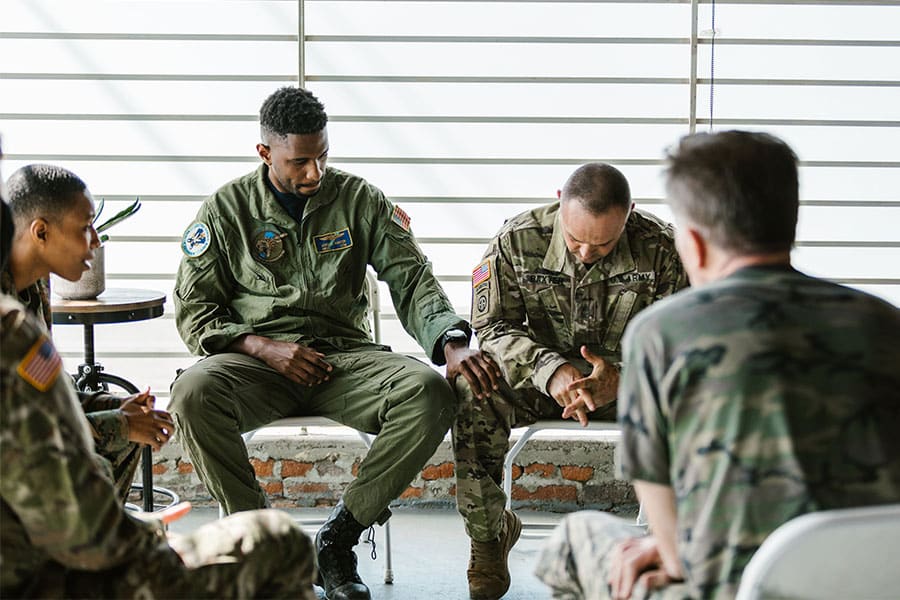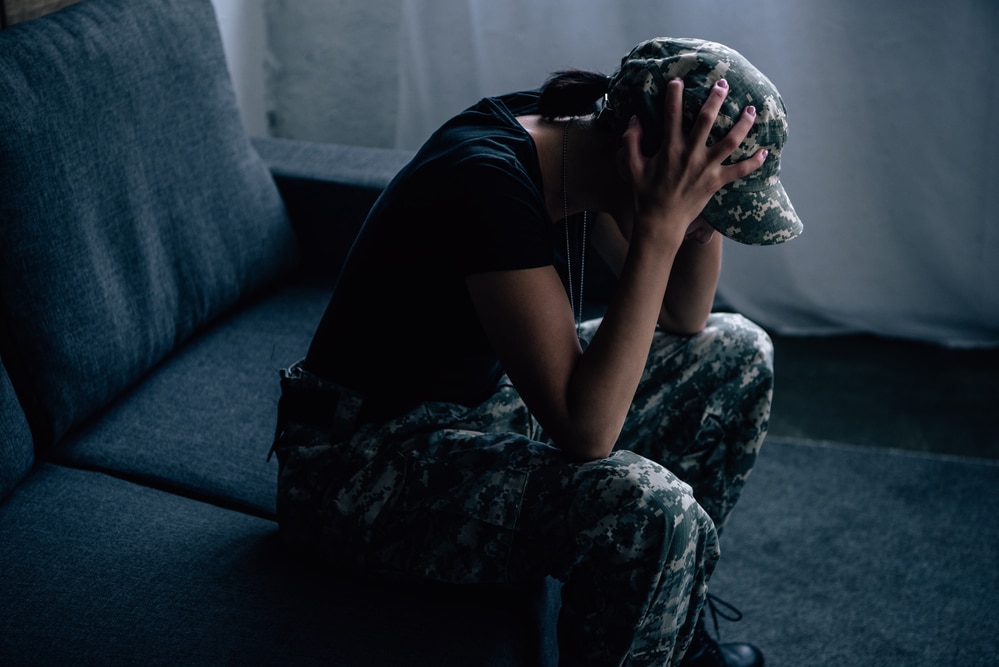Research from the National Institute on Drug Abuse (NIDA) shows that over one in ten veterans struggle with a substance use disorder. With this, 65% of veterans who enter a veteran rehab center report an alcohol addiction. The trauma from combat can lead to unhealthy coping mechanisms, despite programs geared to help inactive military personnel. The best PTSD treatment center for veterans understands how combat and addiction affect recovery.
Veterans make up 7% of the USA’s population. It’s necessary to understand the benefits of a VA primary care provider to offer millions of alcohol and drug dependent veterans and American heroes suffering with mental health issues.

Alcohol Rehab for Veterans
A veterans’ alcohol rehab is an addiction treatment facility that specializes in care for retired military personnel. According to the Journal of the American Medical Association (JAMA), alcohol serves as a coping mechanism after deployment. In one of the first studies of its kind, JAMA found that military personnel deployed to Iraq and Afghanistan dealt with alcoholism.
In short, their traumatic experiences correlated with heavy weekly drinking and binge drinking. To continue, binge drinking is when someone has five or more drinks within a day or during an event. For women, it’s four or more drinks. Binge drinking stood out as a serious issue for both genders. For example, over 53% of military personnel surveyed by veterans affairs admitted to binge drinking.
Their research produced other key findings about veterans:
Alcohol rehab for veterans understands that they face unique problems. Their experience in combat likely leads them to cover the pain with substance abuse. Therefore, a veterans alcohol rehab will deal with the underlying mental health issues to root out an alcohol abuse disorder. Otherwise, neither the trauma nor the addiction will go away fully.
What Makes a Facility the Best Rehab for Veterans?
Not every facility is a perfect match for veterans. In order to say one is the best PTSD treatment center for veterans means they need to be able to recognize signs of comorbidity. Comorbidity, also known as a dual diagnosis, is when a person experiences more than one health disorder at the same time. PTSD and substance use disorder are commonly found together.
A good doctor knows that a one-size-fits-all plan never works with recovering addicts. If a facility is the best PTSD treatment center for veterans they need to get their full personal history to weigh the possibilities. Other mental disorders are known to occur at the same time as post-traumatic stress disorder. This can further complicate a diagnosis when a veteran has alcohol or drug abuse problems.
Veterans may experience these mental health disorders in tandem with PTSD:
NIDA reports that 50% of people with a substance use disorder will have a mental illness. Addiction treatment centers for veterans need to take into account that substance abuse in this population likely means a deeper issue. The interaction of multiple disorders in a recovering addict who is a veteran can lead to a deadly situation if not diagnosed correctly.
The Relationship Between PTSD, Veterans, and Addiction
Up to 60% of Americans experienced a traumatic event. On top of this, up to 8% of the population are diagnosed with post-traumatic stress disorder (PTSD) during their lives. PTSD stems from a traumatic event that evolves into maladaptive behaviors and thoughts lasting a month or more. The mind isn’t able to process the trauma in a healthy way. This can manifest as both physical and mental symptoms.
Veterans experience PTSD more than the average American. P&T, a peer-reviewed journal on medicine, states that some studies report 30% of veterans deal with PTSD. Yet, it’s worth mentioning that the number of veterans diagnosed with this is dependent upon the war served. However, in the past 13 years, around half a million veterans were diagnosed with this disorder.
These are symptoms of PTSD:
Other common symptoms include disassociation, reduced interest in favorite activities, becoming more reclusive, and unwarranted anger. There are more signs than this, but if a veteran has more than one of these symptoms it likely means PTSD. It’s obvious that military personnel face the difficulty that comes from traumatic combat. However, 22% of female veterans experienced military sexual trauma (MST), which adds to the issue. Further, veterans with PTSD relive the trauma they have experienced.
Illicit substance use and alcohol abuse release chemicals in the brain to make them feel calm and pain-free. This is especially because over 30% of veterans with PTSD report chronic pain after the incident. These combined lead to higher levels of drug or alcohol addiction. The best PTSD treatment center for veterans looks at the bigger picture.
What To Expect at the Best PTSD Treatment Center for Veterans
Moreover, the best PTSD treatment center for veterans will go through a screening process. Firstly, they will make sure that the possible patient is a good match for their facility. A recovering addict who is a veteran should vet the facility in return.
New patients at an addiction treatment center should be ready to undergo psychological and physical tests. Doctors and trained staff will likely take bloodwork to determine the severity of the addiction. They might specifically look at cortisol levels to suggest any mental illnesses. Cortisol is the chemical in the body that regulates a person’s fight-or-flight instinct. The staff will also take tests to make sure there aren’t any other physical and mental health issues.
Substance use disorders often lead to health disorders such as:
From a psychological perspective, different therapies are used to determine mental health disorders. A new patient will have an introductory meeting with a therapist or psychiatrist to see if any exist. A personalized plan is then put together for the patient and medically managed detoxification, the first step to rehab will commence to manage withdrawal symptoms safely and effectively. Further care for veterans in Florida include a residential treatment program, partial hospitalization programs and intensive outpatient programs. If an addiction treatment facility specializes in helping veterans, there will probably be a form of group therapy. This helps each individual gain strength from their peers. Their similar experiences can act as a strong support circle.
The best veteran rehab center will also offer treatment covered by TRICARE health insurance for military veterans. Partner insurance providers cover mental health and substance use disorder treatment, which allows veterans to focus more on their recovery.
Types of Therapies Offered at our Drug Rehab for Veterans
Various types of therapies are offered at addiction treatment centers through an inpatient treatment or an intensive outpatient treatment facility. Since they come up with a personalized plan, the type of therapy depends upon the veteran. Popular modes of individual therapy include cognitive-behavioral therapy (CBT), dialectical behavior therapy (DBT), and eye movement desensitization and reprocessing therapy (EMDR). Treatment may also include a relapse prevention plan or sober living program. Each has its own benefits and similarities.

Cognitive-Behavioral Therapy as PTSD Treatment for Veterans
The thought behind cognitive-behavioral therapy is that a patient has certain behaviors and thought patterns that lead to mental illness. For instance, this kind of talk therapy may have a veteran keep a journal. They would write down what triggers their trauma and makes them feel like they have to use drugs or alcohol.
Then, they would establish mental patterns that need to be changed. Perhaps they would ask the patient to use positive self-talk. They might want them to address a situation that triggers association with trauma with a specific, positive thought.
PTSD Treatment for Veterans Through Dialectical Behavior Therapy
Since CBT and DBT are forms of psychotherapy they have a similarity in helping patients heal and improve mental health conditions through talk therapy. The difference is that this form of therapy focuses more on validating feelings and teaching skills to help with PTSD symptoms. For veterans in particular, people with PTSD might find it beneficial to attend DBT in a group setting. Sessions typically last two to three hours.

Eye Movement Desensitization and Reprocessing Therapy for Veterans with PTSD
DBT and CBT can last, at minimum, ten sessions. On the other hand, EMDR uses pointed external stimuli to tap into the subconscious mind. Veterans with PTSD are asked to recall painful memories. Using audio and a gesture like hand-tapping or lateral eye movement can aid the healing process more quickly than other forms of therapy.
P&T singles EMDR out among others as an effective therapy for veterans with a substance abuse disorder and PTSD. This could be because post-traumatic stress disorder acts on a subconscious level. These actions work to relieve the memory network from hidden trauma and its associations.
Behavioral Health Centers is the Top Addiction Treatment Center for Veterans in South Florida
Our veterans are the unsung heroes of our country. While they may put on a brave face, they are plagued with the pain of combat. We consider ourselves to be the best PTSD treatment center for veterans in South Florida because we know the toughest people can have the most difficult problems. Contact us now if you or a loved one needs alcohol rehab for veterans or any other struggle with addiction. Talk to our experts about how we can help with your recovery.
References
https://www.ncbi.nlm.nih.gov/pmc/articles/PMC5047000/
https://www.drugabuse.gov/publications/drugfacts/substance-use-military-life.
https://www.census.gov/library/publications/2020/demo/acs-43.html
https://www.ptsd.va.gov/understand/common/common_adults.asp
https://www.cdc.gov/alcohol/fact-sheets/alcohol-use.html




